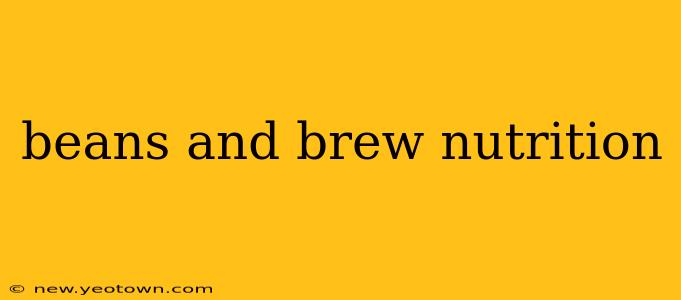The aroma of freshly brewed coffee, the satisfying crunch of a handful of beans – these simple pleasures often start our days. But beyond the delightful senses, lies a surprising nutritional synergy. This article delves into the nutritional profile of both coffee and beans, exploring their individual and combined benefits. We'll unpack the often-asked questions surrounding this dynamic duo and reveal why incorporating them into your diet might be a smart move.
What are the Nutritional Benefits of Coffee?
Let's begin our journey with coffee, a beloved beverage enjoyed worldwide. While its caffeine content often takes center stage, coffee boasts a rich array of beneficial compounds. Think of it as a nutritional powerhouse in disguise! Studies suggest that moderate coffee consumption can be associated with a reduced risk of several chronic diseases, including type 2 diabetes and certain types of cancer. This is largely attributed to the presence of antioxidants, which help protect cells from damage caused by free radicals.
Beyond antioxidants, coffee contains various essential nutrients, although in relatively small amounts. These include riboflavin (vitamin B2), pantothenic acid (vitamin B5), manganese, potassium, and magnesium. Remember, the nutritional content can vary depending on factors like the type of bean, roasting method, and brewing process.
What are the Nutritional Benefits of Beans?
Now, let's turn our attention to beans – those humble legumes that pack a serious nutritional punch. Beans are incredibly versatile, featuring in countless cuisines across the globe. From kidney beans to black beans, pinto beans to chickpeas, the variety is vast, each offering its unique flavor and nutritional profile.
Beans are excellent sources of plant-based protein, crucial for building and repairing tissues. They are also rich in fiber, aiding digestion and promoting gut health. Furthermore, beans are packed with essential vitamins and minerals, including folate, iron, potassium, and magnesium. The high fiber content also contributes to feelings of fullness, making them an excellent addition to any weight-management strategy.
Do Beans and Coffee Interact Negatively?
This is a common question. The short answer is: generally not. While some individuals might experience increased anxiety or digestive discomfort with a combination of caffeine and high-fiber foods, this is more a matter of individual sensitivity than a direct negative interaction. The caffeine in coffee doesn't significantly affect the absorption of nutrients from beans, and vice versa. However, if you notice any negative effects after consuming both, simply adjust your intake accordingly.
Are Beans and Coffee Good for Weight Loss?
Both beans and coffee can contribute to weight management, though not magically. The high fiber content in beans promotes satiety, helping you feel full for longer and potentially reducing overall calorie intake. Coffee, particularly black coffee, is low in calories and can boost metabolism, potentially aiding weight loss efforts. However, weight loss is a complex process involving multiple factors, including diet, exercise, and genetics. Beans and coffee should be seen as supportive elements within a holistic approach.
What are the Best Types of Beans to Pair with Coffee?
The beauty of beans is their versatility! There's no single "best" type to pair with coffee. It largely comes down to personal preference. However, the earthy notes of certain beans, such as black beans or kidney beans, can complement the rich flavors of coffee quite nicely. Experiment to discover your favorite combinations!
Can I Add Beans to My Coffee?
While not a common practice, there's no inherent reason why you can't add beans to your coffee. However, it's unlikely to enhance the taste or nutritional value significantly. The texture might be rather unusual, and the beans themselves wouldn't dissolve. Focus on enjoying them separately to maximize their respective benefits and enjoy their unique qualities.
In conclusion, the nutritional benefits of coffee and beans are undeniable. While their combined effect isn't a magical weight-loss potion or a cure-all, their individual and complementary contributions to a balanced diet are significant. Remember moderation is key, and listening to your body is paramount. Incorporating both into a healthy lifestyle can offer a delicious and nutritious boost to your well-being.

